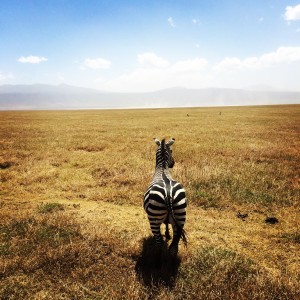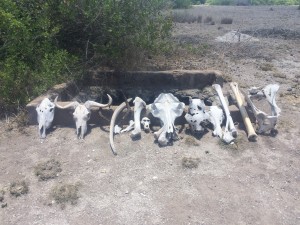We can all agree: poaching is a problem that needs to be addressed. However this is a complicated issue with many facets.

One major problem with combatting poaching stems from the fact that many feel that there is nothing that they can do when they see poaching occur. Engaging ecotourism providers in anti-poaching efforts can be particularly challenging, because they often wish to help but are afraid of getting kicked out of the countries where they operate (if they are foreign producers) or shut down completely (if they are national producers).
An international hotline (I suggest the number: 1-800-NO-POACH) or website where people could send tips or report poached animals could have the potential to fix this problem. The hotline would be operated by either an international non-governmental organization working to fight poaching or the U.S. government itself. It may also be tied to the Spatial Monitoring and Reporting Tool (SMART), which is a ranger-based data collection tool that is used “for measuring, evaluating and improving the effectiveness of wildlife law enforcement patrols and site-based conservation activities.” In Tanzania and other countries where USAID has field agents, these operatives could follow-up on the hotline tips to see if they are accurate. This might allow for a sort of “see something, say something” method for ecotourism providers and other interested parties to anonymously and securely report poaching incidents and other distressing news related to wildlife crime. Any possible way of involving more people in the fight against the illegal killing and trading of wild animals should be explored.
Pros: This anonymous hotline would take away any fear of repercussion from reporting poaching incidents and allow for those who are invested in species conservation to take action. This may be an invaluable service, considering the sophisticated technology that many poachers are using today. This hotline could have massive impacts in the fight against poaching if it is employed and utilized effectively. It will make it easier to track poaching incidents, effectively making it easier to track the poachers themselves. Ultimately this hotline should lead to more arrests of poachers and less poached animals.
This policy option fulfills several objectives of the “National Strategy for Combatting Wildlife Trafficking: Implementation Plan,” which was released by the Obama administration in February of this year. The President’s Task Force on Combating Wildlife Trafficking is comprised of 17 federal agencies and offices. Specifically, this hotline will satisfy many of the objectives of the global enforcement section, including supporting the development and use of effective technologies and analytical tools, enhancing information sharing with international partners, and participating in multilateral enforcement operations.
Cons: Creating and managing an international hotline of this nature will take time and an extended monetary commitment. All parties involved (those institutions funding the hotline, the phone/internet operators of the hotline, and those institutions following-up on the hotline tips) must be dedicated to the mission of combatting poaching and saving wildlife, otherwise this hotline cannot hope to be a success. As with any hotline, the security and anonymity of the hotline cannot be breached. These facets of implementing the hotline will be challenging.
While this hotline contains enormous potential for combating certain kinds of poaching, it is important to remember that poaching comes in a variety of forms. It is necessary to understand that while some poaching is carried out by large, mafioso-style organizations, many times poaching is also a result of either human-wildlife conflict or food insecurity. While both forms of poaching should be mitigated, it is imperative to first diagnose which type of poaching is occurring, before any action is taken. This way the actions taken will be socially and situationally appropriate, as well as hopefully effective in the long-term.




Leave a Reply